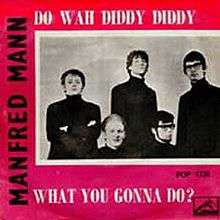Do Wah Diddy Diddy
| "Do Wah Diddy Diddy" | ||||
|---|---|---|---|---|
 | ||||
| Single by Manfred Mann | ||||
| from the album The Manfred Mann Album | ||||
| B-side | "What You Gonna Do?" | |||
| Released | 10 July 1964 | |||
| Format | Vinyl record | |||
| Recorded | 11 June 1964 | |||
| Genre | Pop rock | |||
| Length | 2:23 | |||
| Label |
HMV POP 1320 (UK)[1] Ascot (US) Capitol (Canada) | |||
| Songwriter(s) | Jeff Barry, Ellie Greenwich[1] | |||
| Producer(s) | John Burgess[1] | |||
| Manfred Mann singles chronology | ||||
| ||||
"Do Wah Diddy Diddy" is a song written by Jeff Barry and Ellie Greenwich and originally recorded in 1963, as "Do-Wah-Diddy", by the American vocal group The Exciters made internationally famous by a version by the British band Manfred Mann.
Manfred Mann version
It was soon covered by British R&B, beat and pop band Manfred Mann.[2] Manfred Mann's version, which was more commercially successful, was recorded on 11 June 1964, released on 10 July,[3] and spent two weeks No. 1 in the UK Singles Chart in August,[4] and two weeks at the No. 1 spot in the U.S. Billboard Hot 100 in October.[5]
Other versions
The song has been covered many times, notably by DJ Ötzi whose version titled "Do Wah Diddy" peaked at #9 on the Ö3 Austria Top 40, as well as charting in Germany, Switzerland, the UK and Ireland. Dutch girl group Dolly Dots recorded the song in 1982.
In popular culture
It was used as the theme song for Ang TV, a famous youth-oriented variety show in the Philippines from 1992–1997.
See also
References
- 1 2 3 Rice, Jo (1982). The Guinness Book of 500 Number One Hits (1st ed.). Enfield, Middlesex: Guinness Superlatives Ltd. p. 82. ISBN 0-85112-250-7.
- ↑ Roberts, David (2006). British Hit Singles & Albums (19th ed.). London: Guinness World Records Limited. p. 166. ISBN 1-904994-10-5.
- ↑ Archived May 25, 2006, at the Wayback Machine.
- ↑ "All the Number One Singles: 1964". The Official Charts Company. Retrieved 13 June 2010.
- ↑ Bronson, Fred (1992). The Billboard Book of Number One Hits (3rd ed.). New York, NY: Billboard Publications, Inc. p. 158. ISBN 0-8230-8298-9.
External links
| Preceded by "A Hard Day's Night" by the Beatles |
UK Singles Chart number-one single 13 August 1964 (2 weeks) |
Succeeded by "Have I the Right?" by the Honeycombs |
| Preceded by "Oh, Pretty Woman" by Roy Orbison |
Billboard Hot 100 number-one single 17 October 1964 (2 weeks) |
Succeeded by "Baby Love" by the Supremes |